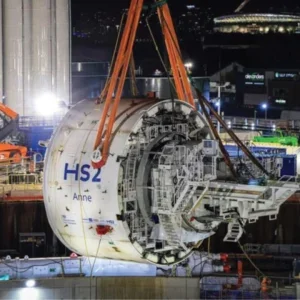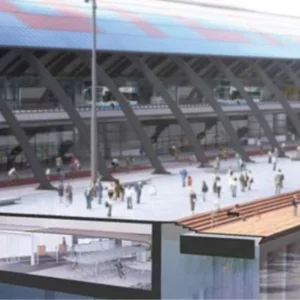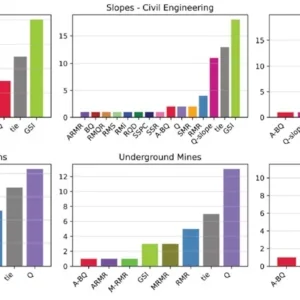Crossrail, Europe’s largest infrastructure project, will connect 40 stations across Greater London and sees the construction of 10 entirely new stations, the scale of which travellers have not seen the like of in the UK. Crossrail station platforms will be 250m in length in order to accommodate the new 200m-long trains that will pass through from the outset and enabling 240m-long trains to operate in the future as passenger demand increases.
Platform Safety
As around 200 million passengers are expected to travel on Crossrail each year, safety is paramount and one of the key safety measures is the installation of platform edge screens (PES) at the stations.
Knorr-Bremse Rail Systems UK’s platform screen door system – 4km in all – is being integrated with the PES, which will sit above, bolted in to the crown of the tunnel to fully enclose the platform.
In five of the new stations, Tottenham Court Road, Bond Street, Liverpool Street, Farringdon and Whitechapel, where sprayed concrete forms the platform tunnel linings, the bolts that fix the metal framework that holds the PES in place are being supplied by Excalibur Screwbolts, an innovative SME based in Essex.
You may be able to count the number of Excalibur Screwbolts’ full-time employees on the fingers of one hand but its relatively small size hasn’t stopped it from becoming a leading name in the sector and a go-to company for major infrastructure projects, including tunnelling.
In fact its patented and apparently unique twin helix thread bolts have been used in landmark projects such as the Gotthard Tunnel and the Channel Tunnel Rail Link (CTRL). One legacy of the latter project in particular, was the call to supply Crossrail.
Design life leap
With many engineers and project managers migrating from CTRL to Crossrail, the company’s name was front of mind but the contract wasn’t a foregone conclusion. CTRL had called for a design life of a mere 25 years, whereas Crossrail was specifying 120 years.
Fortunately, however, Excalibur Screwbolt was ahead of the game in developing a product with greater longevity.
"Standard European Technical Assessment-approved fixings have an estimated design life of 50 years, so 120 years might have seemed a tall order," said Jim Clement, technical manager. "However, we had already developed a new and revolutionary Screwbolt PLUS, which has extremely high levels of corrosion resistance.
"Prior to this our standard surface finish comprised electro-zinc plating with a passivation and we were often asked if we would produce high-grade stainless steel screwbolts," said Clement.
"For technical reasons, we considered this wasn’t suitable for the Excalibur Screwbolt so we embarked on our own intensive development programme to find a unique new process of corrosion resistance for our entire range of products.
After a period of in-house trials and performance testing, Excalibur Screwbolt PLUS was born."
Testing process
Rigorous testing followed, including at Ford Motor Company, which carried out a nine week accelerated cyclic corrosion test on the Screwbolt PLUS. It passed with flying colours – in fact, it performed significantly better than the high-grade stainless steel alternatives that were subjected to the same tests.
Other testing, at SGS MIS Testing Ltd, demonstrated that Screwbolt PLUS survived 6,200-hour salt spray resistance testing – a dramatic improvement on the 1,000-hour salt spray resistance afforded by the standard mechanical zinc finish screwbolt.
"This data supports the technical opinion that the Screwbolt PLUS will last in excess of 120 years," said Clement. "It’s a great leap technologically and it takes our screwbolts’ performance to another level.
"This technological advancement in corrosion protection substantially increases the whole life expectancy of an anchor in the harsh environmental conditions associated with tunnels," he continued.
"In practical terms, removing the need for replacing less robust anchors at regular intervals means that maintenance and renewal costs are greatly reduced."
It was around the same time that Crossrail came calling with its contract for mechanical fixing (it didn’t want to use resin fixing) into the crown of its SCL platform tunnels. As well as the requirement for a 120-year design life, the bolts also had to be long enough to cope with the sometimes-variable thickness of the SCL.
As a result, and in collaboration with Atkins design consultancy, Excalibur Screwbolt developed a 420mm-long, 20mm-diameter screwbolt.
Even at this point the contract wasn’t in the bag as Crossrail then carried out its own exhaustive testing.
Station mock-up
In order to develop and test designs for the underground station platforms, Crossrail created a life-size mock-up measuring 20m in length, 10m in width, with a ceiling height of 5m above the platform-edge doors. It also contains a 4m long side-tunnel entrance providing entrance and exit.
Crossrail also commissioned Imperial College London’s Department of Engineering and Vinci Technology to put the Screwbolt PLUS through its paces in order to ensure it could withstand the relevant stresses and strains involved with the designated design life into the SCL.
Tests conducted included tension and shear tests, cyclic tension and shear tests and mock-up simulation tests to top and side connections.
"Screwbolt PLUS has now gone through one of the most arduous testing regimes possible, well beyond normal testing," said John Stevens, sales manager.
The results, contained in a confidential 55-page report, were apparently positive, leading to the Screwbolt PLUS being added to the Crossrail design specification.
The contract calls for several thousand screwbolts for each of the five station platform tunnels.
The base product is produced in Poland using high-grade steel obtained from within the EU and then the majority of the work – the hardening and surfacing operations – is carried out under license by two third-party manufacturers in the UK.
Installation
Installation work has progressed smoothly. At the time of writing, the main metal work had gone in at Tottenham Court Road and Bond Street and work was starting at Liverpool Street.
"The two contractors we’ve been working with so far, Laing O’Rourke and Costain Skanska JV have been happy with the speed at which they’ve been able to progress," said Stevens. "We assisted by being on site and helping the contractors as much as possible but once they had set themselves out it was very straightforward."
He added that one of the benefits of a screwbolt is that, should the need arise, it can simply be unscrewed and relocated.
That wouldn’t be possible with an expansion anchor or resin anchor without damaging a prime asset – the tunnel lining.
"Crossrail has put the bar higher than it has ever been before so we’ll have to wait and see if other projects want to match it," said Stevens. However, looking ahead, Excalibur Screwbolts is confident that its PLUS product will find favour as a cost-effective alternative to high-grade stainless steel fixings in other tunnel projects.
"We’re very proud to be associated with Crossrail and we hope the spin-off from this will be the development of our product within the tunnelling industry nationally and internationally," added Clement.
"As a small company our policy has been to try to keep one step ahead of the competition and the only way to do that is to think laterally and be brave enough to do something different," he added.
"I believe that this is what we have achieved with this product and what we have achieved as a company. We believe the potential for this product to expand into other contracts on a worldwide basis is significant.
"We have shown what strength British companies have in the development and innovation of new products," said Clement. "And, in so doing, we’ve been able to provide a solution to a problem on a landmark British project"






